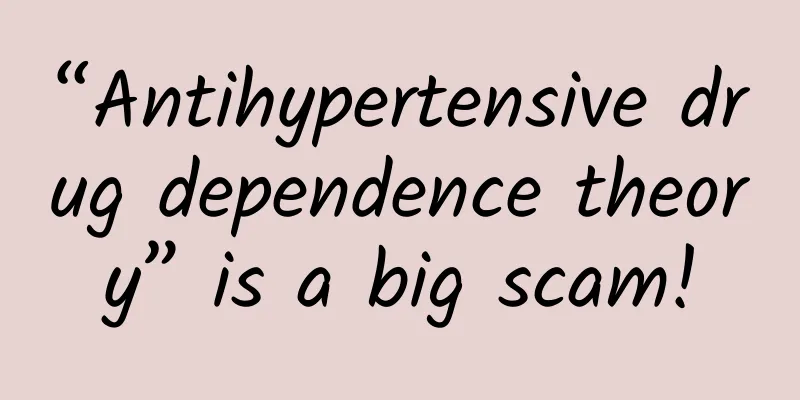“Antihypertensive drug dependence theory” is a big scam!

How could this happen? The "hypertensive drug dependence theory" is a big scamAmong patients with high blood pressure, there is a saying that goes, "Don't take antihypertensive drugs. Once you start taking them, you can't stop." Because of this saying, many people are deterred from taking antihypertensive drugs even if they have high blood pressure, and would rather silently endure the potential risks. But is this view really correct? Today, we will analyze it in depth and reveal the true "face" of antihypertensive drugs. From the perspective of medical principles, hypertension is a chronic disease characterized by increased systemic arterial blood pressure. The normal blood pressure range is 90-139mmHg for systolic pressure and 60-89mmHg for diastolic pressure. When the systolic pressure is greater than or equal to 140mmHg and (or) the diastolic pressure is greater than or equal to 90mmHg, it is diagnosed as hypertension. Long-term high blood pressure will cause lasting damage to important organs such as the heart, brain, kidneys and eyes. For example, the heart needs to withstand greater pressure to pump blood, which can easily cause myocardial hypertrophy or even heart failure; cerebral blood vessels may rupture and bleed due to high pressure, leading to stroke; kidney blood vessels and glomeruli will also be damaged, affecting kidney function. So what role do antihypertensive drugs play in this? Their function is to help the body regulate blood pressure and keep blood pressure at a normal level, thereby reducing damage to various organs. There are five major types of antihypertensive drugs currently in common use, including diuretics, beta-blockers, calcium channel blockers, angiotensin-converting enzyme inhibitors (ACEI) and angiotensin II receptor antagonists (ARB). They work through different mechanisms. For example, diuretics lower blood pressure by promoting urine excretion and reducing blood volume; calcium channel blockers prevent calcium ions from entering vascular smooth muscle cells, causing vasodilation and lowering blood pressure. The reason why some people think that "once you take antihypertensive drugs, you can't stop taking them" is that they confuse drug "dependency" with the characteristics of the disease itself. Drug dependence refers to the body's physical or psychological dependence on the drug, and withdrawal symptoms will occur after stopping the drug, such as opioid addiction. But this is not the case with antihypertensive drugs. Hypertensive patients need to take medication for a long time because hypertension itself is a chronic disease that is difficult to cure, and most patients' bodies cannot adjust their blood pressure back to normal. As long as blood pressure is not effectively controlled, the harm caused by high blood pressure will continue to exist. Of course, there are some patients who can adjust or even stop taking antihypertensive drugs under certain special circumstances. For example, some patients have seen a significant drop in blood pressure after improving their lifestyle. If the blood pressure was only slightly elevated, through long-term adherence to a low-salt diet, regular exercise, smoking cessation and alcohol restriction, and maintaining a good work and rest schedule, weight loss, improved body metabolism, and blood pressure continued to stabilize within the normal range, under close monitoring by a doctor, it is possible to gradually reduce the dose of antihypertensive drugs or even stop taking them. But this must be done under the strict guidance of a doctor and must not be decided on your own. Because if you stop taking the drug rashly, your blood pressure is very likely to rebound quickly, bringing greater risks. For patients with hypertension, instead of worrying about the "so-called dependence" on antihypertensive drugs, it is better to actively cooperate with treatment. Long-term and standardized use of antihypertensive drugs can significantly reduce the risk of various complications caused by hypertension. A large number of clinical studies have shown that patients who insist on regular medication to control blood pressure have a much lower probability of developing cardiovascular and cerebrovascular diseases than those who do not receive standardized treatment. Antihypertensive drugs are not "a scourge", and taking them is not to fall into an "addiction" that cannot be shaken off, but to build a solid line of defense for health. In the face of high blood pressure, we should abandon misconceptions, treat it with a scientific attitude, actively communicate with doctors, follow doctor's advice, keep blood pressure under effective control, and protect our health. |
Recommend
Angel Song~
This is the 4793th article of Da Yi Xiao Hu You c...
What kind of leaders use violence against honest people? How can we avoid being attacked by leaders?
Honest people usually do things in a down-to-eart...
Is gamete intrafallopian transfer successful?
GIFT is a new method for treating infertility tha...
By 2023, more than 2 billion 5G smartphones will be shipped worldwide, half of which will come from Apple and Samsung
According to foreign media reports, since 5G bega...
Is the liquid dark area an early gestational sac?
Some women were found to have dark fluid areas in...
Can induced abortion be performed at eight months?
Some women, for some reasons or because of the fe...
Does the disappearance of ovulation pain mean that ovulation has taken place?
Important reminder: The different body materials ...
How long does a hysteroscopic procedure take?
Hysteroscopic surgery is a common gynecological s...
Maintenance methods after subtotal hysterectomy
The female body structure is very complex, and th...
Price of normal delivery
Pregnant women who are convinced that they are go...
There may still be a cure for your dysmenorrhea!
Content from : Gu Zhuowei Shanghai Renji Hospital...
What is the reason why women have sore legs?
The symptoms of sore legs in women are relatively...
Why does vaginal pain occur when urinating?
Many women report that they often experience vagi...
What is the difference between Airpods Pro and Airpods 2? Who is AirPods Pro not suitable for?
After the release of Airpods Pro, many netizens w...
What to do if intrauterine adhesion is serious? Three common treatment methods
Women with intrauterine adhesions will experience...









